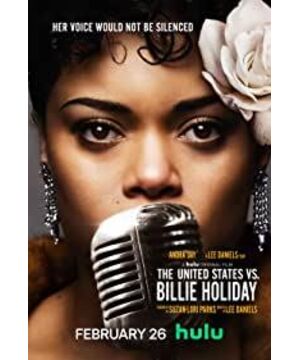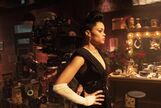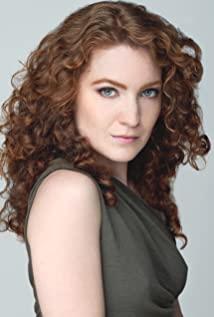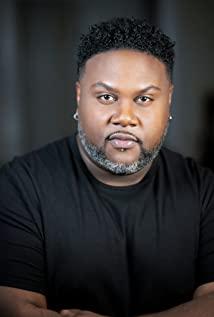This is my most direct feeling after comparing two Billie Holiday biopics shot in different years in Hollywood. Reversing the case can either mean bleaching the original black to white, or bleaching the original white to black. For example, in the United States last year because of the black people’s kneeling and killing incident, they were toppled, beheaded, and defaced the statues. , This film contains the above two reversals at the same time. Let's first briefly understand the basic knowledge related to the film.
1. In 1972, Hollywood has filmed a Billie Holiday biopic Lady sings the blues , starring the famous black female singer Diana Ross. This is her screen debut and won 5 items including best actress. Oscar nominated. That film is mainly based on the personal biography of the same name published by Billie Holiday during his lifetime. From her childhood experience, it tells about her road to fame, her relationship with her husband Louis Mckay (Louis Mckay is a positive role in the film), and The unavoidable experience of a lifetime entangled with drugs. It is also mentioned that he was in jail for possessing drugs, but the federal agent did not even show his face in the film. The story in the film only ends when Billie Holiday sings on the stage of Carnegie Hall. Looking at the film from today's eyes, the overall performance is mediocre. Only the green screen image of Diana Ross and the French soundtrack master Michel Legrand ("The Umbrella of Cherbourg", "Summer of 42" and "The Windmill of Your Mind") created the film for the film. The unspeakable theme of love has been passed down to this day. This love theme was later written into a popular song called Happy. It was covered by many well-known singers including Michael Jackson. I think Johnny Mathis's sung version is the best. You can find it and listen to it. The soundtrack of this movie is available online.
2. This film is adapted from the part of Billie Holiday in the book "Chasing the Scream: The First and Last Days of the War on Drugs" published in 2014 by the British white investigative reporter Johann Hari. The content of this book traces the drug crimes in the history of mankind and the countermeasures taken by governments of various countries. Part of the content about Biliie Holiday can be read here: The Hunting of Billie Holiday This part of the content has also become the main basis for the relevant content in the Billie Holiday wiki entry. The author Johann Hari was exposed in a plagiarism scandal in 2011, and was forced to resign from his employer at the time. That is to say, this person has a history of credibility (key point!), then the credibility of his book has a certain degree of credibility. Try to figure it out .
3. The main content of this film: In 1947, the Director of the Federal Bureau of Narcotics (Federal Bureau of Narcotics, a subsidiary of the U.S. Department of the Treasury in 1930 and was revoked due to government institutional reforms in the 1960s), Harry Anslinger, in order to stop Billie Holiday sang the anti-lynching civil rights song Strange Fruit in an effort to convict and sentence him for possession of drugs and ruin his reputation. For this reason Harry Anslinger sent a black agent Jimmy Fletcher undercover, but the black agent and Billie Holiday got into bed instead. Billie Holiday’s husband Louis Mckay and director Harry Anslinger are both negative roles in the film.
4. Harry Anslinger (1892-1975), he was only 38 years old when he became the director of the US Federal Narcotics Control Service in 1930. According to the film’s era, he should be 55 years old in 1947. The actors in the film were obviously improperly cast. , Is too young, and when he first appeared, he did not indicate that he was the director, which made people mistakenly think that he was just an ordinary detective. After taking office, Harry Anslinger was aggressive and aggressive, launched a massive anti-drug war, and intensified the punishment of drug-related behaviors in the society. Because of his effective work during his tenure, he was commended by President Kennedy. Show), it can be said to be a good servant of the people. But in the book written by the aforementioned journalist Johann Hari (and the film adapted from it), he is described as a notorious racist who sees black musicians and their music as a flood of drugs in society A source of the crime, to be deliberately attacked. At that time, there were many people who used drugs in the entertainment industry, including many well-known white artists such as Judy Garland. In Johann Hari's book, the relationship between Judy Garland and Harry Anslinger was taken as an example, highlighting the description of Harry Anslinger facing the same white people who used drugs. Two completely different faces of an artist and a black artist. In the book, Anslinger's attitude towards Judy Garland is extremely flattering and justified in every possible way, and he is full of racist prejudice and hatred towards black artists such as Billie Holiday. Part of the content in his Wiki entry also comes from the content in Johann Hari's book.
5. The anti-lynching civil rights song Strange Fruit was composed by Abel Meeropol, a white Jewish teacher living in New York, based on the lynching and hanging of black American youth Thomas Shipp and Abram Smith in the summer of 1930. Two black youths (actually three, one of the youngest escaped by chance) robbed a pair of white youths who were in love and killed the boys. After being arrested, it was rumored that girls had also been raped and caused civil riots. Dragged out from the prison and hanged in full view. For the ins and outs of the incident, go here to read "Thousands of White People Killing Two Black People: The Bloody Record of the Last Lynching in the United States" , the picture is bloody, be careful! ! ! I especially remind you to read the comments below the article . Look for the lyrics yourself. Simply put, the black corpse hung on the tree is described as a strange fruit on the tree.
6. Abel Meeropol (1903-1986), a white Jewish teacher, was an out-and-out white leftist and a communist. He had adopted the orphan of the Luxembourg couple, the most famous spy executed for leaking nuclear bomb secrets to the Soviet Union in American history. . Strange Fruit was originally a poem he created after seeing photos of black young men Thomas Shipp and Abram Smith being hanged from a tree and hanged. It was first published in industry publications in 1937 (7 years after the incident). Later, he himself The music was composed and sung on some private occasions, and it was passed to the owner of a nightclub in Greenwich Village (a place where liberals live) in New York. The two owners of this nightclub are both whites, one of them is Jewish, and both of them have a sympathetic attitude towards the fate of blacks. Among them, John Hammond is also a well-known civil rights activist. Their nightclub was one of the few in New York that accepted blacks at the time. A performance venue for musicians and spectators. Billie Holiday is the singer-in-residence at that nightclub. On the recommendation of the boss, she performed this song in the nightclub in 1939 and recorded the album in the same year. The cumulative sales of the album exceeded one million, which is an out-and-out popularity. Golden song.
7. Then the problem came. Strange Fruit became a popular hit in 1939, and Harry Anslinger served as the director of the US Federal Narcotics Control Service in 1930, with a lot of power in his hands, but according to the film, he didn't think of using illegally until 1947. Catch Billie Holiday on the charge of possession of drugs and stop her from singing the inflammatory civil rights song Strange Fruit? ! Why did he go in the middle 8 years? We have to admire the ability of the film's creator to deliberately shift flowers. At the end of the film, when Billie Holiday was dying in the hospital in 1959, Anslinger and his agents went to the hospital to force her to confess guilt. Please, Anslinger was already 67 years old at that time. Do you believe that a 67-year-old director would personally go to the hospital to do this kind of thing? This is too fucking drama! Well, some people might say that this is an adapted feature film, not a documentary. You don't need to stick to the authenticity of the details. Then I return to my original intention of writing this article . What the hell is this deliberate adaptation? Who the hell is deliberately instigating race relations, creating racial divisions, and inciting racial confrontation? ! I now understand why I started to like to watch old Hollywood movies made in the 80s and 90s or even earlier. There are not so many blacks in those old movies, and there are not so many hostiles overflowing the screen. Even if there are black actors, there are Race relations at least seem to be harmonious and warm. Films such as "Drive for Miss Daisy" in 1990 can win Oscars, and no one would say that the role of a gentle and submissive black driver in the film devalues the status of black society. No one should dare to make this kind of film now, and now it will only shoot "Green Book" in which white people drive black people. That way, it is in line with the political correctness of "black life is expensive". Does anyone realize that this political correctness is actually stifling the creative freedom of filmmakers? !
8. Billie Holiday was indeed arrested and imprisoned for possession of drugs in 1947, and that was the first time she was arrested for possession of drugs (there was another arrest in San Francisco in 1949). But her fate with drugs has actually been around for a long time. The film does not tell how she became addicted to drugs. In 1972, Lady Sings the blues, it was explained that when she was young, she went touring with an all-white band. Because of the intensity of the performance and lack of energy, she used drugs to refresh herself under the induction of the band members, which led to her degeneration step by step. Addict. In the 1940s, at the peak of her career, she was able to earn more than 1,000 US dollars per week from club performances (at that time, the average monthly salary in American society was less than 200 US dollars, and a new private car only cost 8,000 or 900 US dollars), but most of them were lost. She spent on drugs. Billie Holiday lost her bar performance license after being sentenced. She was forbidden to sing in all nightclubs, clubs, bars and other venues where alcoholic beverages were sold. At the time, few of these venues did not sell alcohol, which greatly reduced her income. , Coupled with her poor management of the copyright of her recordings, and very little royalty income. At the time of her death, her bank deposit was only $0.7.
9. The pop music industry in the United States with singers at its core did not begin to flourish until the mid-1950s with the advent of rock music. Prior to this, there were few singers who were famous for their personal charm. Most of the singers were attached to the existence of dance floor bands, and there were not many opportunities to record records. Most of them were publishing single records. They were able to release solo albums and hold solo concerts. Few, no singer can make a living just by selling records and holding concerts. Selling singing in bars, nightclubs and other places is a very important source of income. Billie Holiday's earliest solo album was released in 1952. Despite her notoriety, less than two weeks after her release from prison in 1948, she held a solo concert at Carnegie Hall with the help of her agent. The film lady sings the blues described her as playing at Carnegie Music. The first person to successfully hold a jazz concert in the hall. In this concert, she sang the signature song Strange Fruit without any restrictions.
10. Two years before Billie Holiday's death, that is, in 1957, she married her long-term lover Louis McKay. This happened many years after she was repeatedly in prison for drug-related matters. In fact, she had had relationships with other men before and had been married. So, do you still believe in the negative image of the husband in this film who surrendered his wife to federal agents as if he was smashing a shoe?
In short, this film is intended to reverse the case of the addict Billie Holiday as a saint of the civil rights movement, and portray her life's misfortune as the result of deliberate political persecution by the US government based on racial discrimination. This makes me sick.
View more about The United States vs. Billie Holiday reviews











